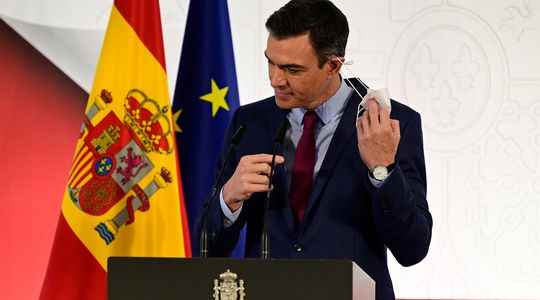What could have been going through Pedro Sanchez’s head that in the midst of the energy crisis, while the war is raging in Ukraine, Spain is angry with Algeria, one of the main suppliers of gas from Europe? In a letter addressed on March 14 to the King of Morocco, Mohammed VI, the President of the Spanish government made a 180 degree turn on the Western Sahara file. To everyone’s surprise, without warning either his far-left Unidas Podemos coalition partners or his own foreign minister, the socialist leader put an end to the neutrality that had prevailed in his country on this issue since… 46 years.
Made public by Rabat on March 18, his missive announces that from now on, Madrid supports the grip of the Alaouite monarchy on the former Spanish colony, territory claimed since 1976 by the Polisario Front (supported by Algeria). According to Pedro Sanchez, the project of autonomy for Western Sahara within the Kingdom of Morocco constitutes “the most serious, realistic and credible basis” for ending the conflict in the region. In other words, Spain no longer respects the promise made by the UN of a referendum on self-determination.
But to support Morocco is to get angry with Algeria, a supporter of the independence of Western Sahara. As soon as the letter from the head of the Spanish government was known, Algiers, amazed at the “sudden reversal” of the former colonial power, recalled its ambassador to Madrid. And since then, Pedro Sanchez has been struggling to defuse the bomb, explaining that it is a question of establishing “a new relationship between the kingdom of Morocco and Spain”, after nearly a year of migratory tensions between the two countries.
A turnaround at the wrong time
In April 2021, Madrid had accepted, at the request of Algiers, to welcome the leader of the Polisario Front, Brahim Ghali, then sick with Covid-19. Rabat immediately severed diplomatic relations with Spain and increased pressure by letting some 10,000 Moroccans seeking emigration enter the Spanish enclave of Ceuta on the northern coast of Morocco on May 17. The reversal of Spain comes at the worst time. “In an already complicated international context, this country clearly indicates that it gives priority to the fight against illegal immigration from Morocco rather than to the supply of gas from Algeria”, deplores Josep-Maria Arauzo-Carod, professor of economics at the University of Tarragona.
As Europe seeks to do without Russian hydrocarbons, in order to dry up funding for the Putin regime, some fear that Algeria will reduce its gas exports, as it did last October by turning off the tap the Maghreb Europe (GME) gas pipeline which passes through Morocco and joins Cordoba, passing under the Strait of Gibraltar. Since then, Spain has been supplied with Algerian gas only by another underwater pipeline, the Medgaz, which crosses the Mediterranean near Almeria, and by boat, in liquefied form (LNG).
To minimize the new diplomatic tensions with Algiers, the entourage of Pedro Sanchez argues that Algeria can hardly do without its Spanish client: in 2021, underlines the Spanish Ministry of Industry, Madrid bought him “for 4, 3 billion euros of fossil fuels, including 2.6 billion euros of gas”. In total, Algeria met 45% of Spain’s gas needs last year.
Europe, Algeria’s “predilection natural market”
Moreover, it is not through Spain that Algeria transports the most gas to Europe, but through Italy. The Transmed gas pipeline, which crosses Tunisia and Sicily, transports 20 billion cubic meters per year, but when fully used, its capacity could amount to 32 billion cubic meters, four times more than the Medgaz which supplies Spain. At the end of February, just after the start of the invasion of Ukraine by the Russian army, the CEO of the Algerian hydrocarbon company Sonatrach declared that Europe was Algeria’s “natural market of choice”. , the latter already providing 11% of gas imports from the old continent. This should reassure those who are worried about Madrid’s new posture in Western Sahara.
With the war in Ukraine, the Iberian Peninsula could also play a strategic role for the future supply of the rest of Europe. The Spanish operator Enagas could be led to increase the redistribution of LNG by LNG tanker to other ports in the Mediterranean and the Atlantic, at the same time as the construction of the Midi-Catalonia gas pipeline (MidCat) through the Pyrenees could be relaunched. . A site frozen by France in 2018.
But Pedro Sanchez is not going to get off so easily. He is expected on March 30 at the Cortes, the Spanish Parliament, for an explanation of the text which promises to be explosive.
